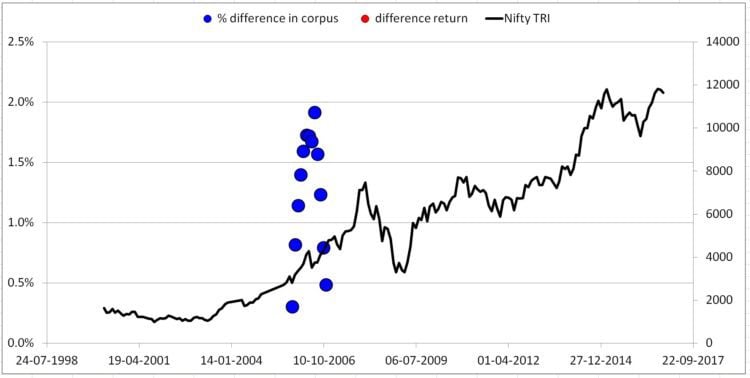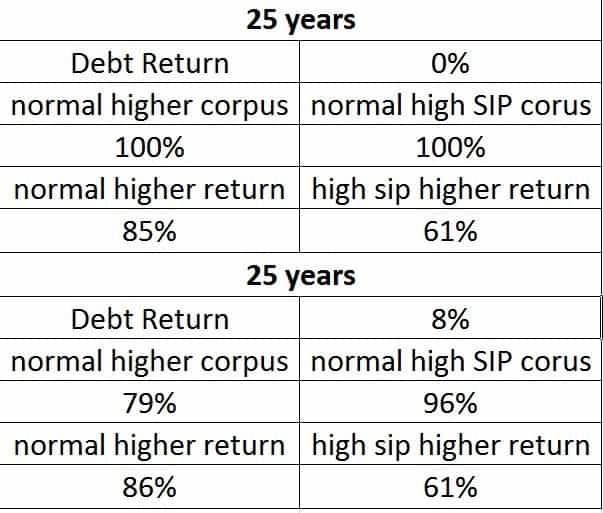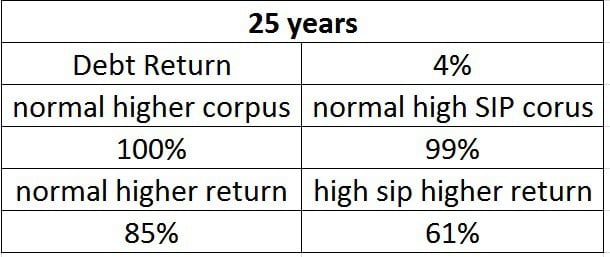Last Updated on December 19, 2021 at 11:44 am
The previous two studies on buying “low” vs. buying “systematically” pointed to the surprising regularity with which systematic investing does better (or at least as well as – good enough).
In response to this, many suggested that in order to ensure buying “low” wins, I should ensure the cash that is put away waiting for the right “time” to invest in the market should not be idle and should be allowed to grow in a suitable instrument (liquid fund, ultra short-term fund etc.).
Therefore, in order to allow buying “low” to win, I have assumed that such cash grows at the rate of 8% a year or 0.64% monthly (1+0.64%)^12 = (1+8%) . We assume no tax need be paid, no exit loads exist and the return will be set in stone for as long as we would invest. Anything for good old buying “low”.
With these assumptions, we repeat the previous study with the Nifty TRI and S &P 500 total return indices. Three types of investments will be considered as before:
Join 32,000+ readers and get free money management solutions delivered to your inbox! Subscribe to get posts via email! (Link takes you to our email sign-up form)

🔥Want to create a complete financial plan? Learn goal-based investing? Exclusive access to our DIY tools? Increase your income with your skills? Use this link to enjoy massive discounts on our robo-advisory tool & courses! 🔥
Normal SIP – buying on the first of each month, regardless of index level.
Buying Low – buying on the first of each month only if the index is less than the last ten months average (10MMA). This is a good enough replacement for the 200 DMA as established before. Nothing Earth shattering is going to happen by choosing a different moving average.
Buying High – buying on the first of each month only if the index is more than the last ten months average. No one is going to invest this way, but the aim is find out how good or bad buying high as an option is. If buying high does not matter much, then for sure, buying every month is does not matter too.
For the last two options, we will assume that cash stored away is invested when the time is right. For example, if Rs. 100 is the month investment made via a normal SIP, and if the index was above the 10MMA for say, 7 months, then in the eight month, Rs. (100 x 7)+ interest earned at 8% (p.a) + Rs. 100 would be invested.
In all three cases, the total investment is adjusted to be the same in the final purchase. If this is not made, the low-SIP (or high-SIP) could have a total investment as low as 50% of the normal-SIP.
It is important to recognize that the cash is only invested for a few months. It will earn a constant monthly interest and not the full 8% (p.a). If your liquid fund investment of four months has a XIRR of8%, it only refers to an annualized return of 8%. It does not mean money has grown at 8% each month!
XIRR is a non-intuitive approximation. A higher corpus does not mean a higher XIRR! They are distinctly different.
Results for Nifty TRI with 8% debt return
The results of idle cash (debt return = 0%) and active cash (debt return = 8%) are compared below for 5Y, 10Y and 15Y.
Normal higher corpus = probability of normal-SIP providing a higher corpus than low-SIP.
Normal high-SIP corpus = probability of high-SIP providing a higher corpus than low-SIP.
Normal higher return = probability of normal-Sip providing a higher return (XIRR) than low-SIP
High Sip higher return = probability of high-SIP providing a higher return (XIRR) than low-SIP.

Notice that over 5Y and 10Y periods (bet. Apr 2000 to Nov. 2016) when the cash is active, the probability of normal-SIP outperforming the low-SIP reduces significantly. However, it is not low enough to claim the low-SIP strategy is better. There is no change in return probabilities, but let us put that down to a XIRR quirk and ignore that
Even during the periods when the low-SIP corpus, was higher than the normal-SIP corpus, the percentage difference in corpus (blue dots below) was quite small.

How that be? Is it not common sense that low-SIP should win? And low-SIP should win at all costs, should it not? Somaybe this study should be repeated with a tax-free, exit-load free, fixedincome return of 14% (monthly?)?
Results for S & P 500 with 8% debt return
If I choose the active cash return to be 8%, this is what we get for a studybetween July 1901 to Sep 2016 –whopping 1143, 25-year periods.

The probability of a normal SIP getting a higher corpus than a low-SIP drops by 21% when the debt return goes from 0 to 8%. The trouble is, 8% fixed income return is unrealistic for the US market (except for short periods in history).
Therefore I think 4% is a more realistic fixed income return. Even this is for long-term bonds. The money market returns would be lower. When re-tested with 4%, the numbers did not differ much from 0% debt return.

Amusingly, only 37% of the 1143 25 year periods, the equity return was greater than 8%! And about 36% of the times, the equity return was less than 4%!
So there you have it. The normal SIP is pretty decent way to invest. Buy low if you wish to, but do not assume that it is a better strategy. There is no evidence to back that up.
Couple of caveats associated with systematic investing.
Risk management is crucial and is possible without stopping the systematic investing.
Systematic investing does not mean investing in the same fund or security. It just means, investing with a set asset allocation each month.
Systematic investing does not mean investing on the same day each month. It just means once a month on any day convenient without recourse to index value or market valuation.
Chennai DIY Investor Workshop Jan 29th, 2017
The fifth Chennai DIY investor workshop will be held on Jan 29th, 2017. Ashal Jauhari and I shall be the speakers. Read more and register for the event using the link below.
YOU can be Rich too with goal based investing
Our new book helps you answer the right questions on money management and invest with a clear purpose! Now available as hardcover and on Kindle.
Including 9 online calculator modules to create your own financial plan.
By PV Subramanyam and M. Pattabiraman.
Hardcover (₹ 375)
Kindle (244.30)
Also available with a (total)discount of ~ 30% (Rs. 280) at Infibeam if you use the discount code BS10.
What Readers Say about You Can be Rich Too
You Can be Rich Too With Goal-Based Investing is my new book with Subra(money.com) published by CNBC TV 18.
Highly recommended
For anyone who wishes to take control of his/her finance this book is a must read. Very simply put, even an amateur in finance will be able to understand and implement. The author genuinely attempts to inculcate the habit of investing among the people who have the ability to invest but refrain from doing it, either due to lack of time , interest or understanding!. The message from the book is ” Investment done without setting a goal/ objective is like leaving for a trip without knowing the destination, not everytime the end result will be promising. Hence, it’s important to invest in a planned & disciplined manner.” A read is highly recommended.

Use our Robo-advisory Tool to create a complete financial plan! ⇐More than 3,000 investors and advisors use this! Use the discount code: robo25 for a 20% discount. Plan your retirement (early, normal, before, and after), as well as non-recurring financial goals (such as child education) and recurring financial goals (like holidays and appliance purchases). The tool would help anyone aged 18 to 80 plan for their retirement, as well as six other non-recurring financial goals and four recurring financial goals, with a detailed cash flow summary.
🔥You can also avail massive discounts on our courses and the freefincal investor circle! 🔥& join our community of 8000+ users!
Track your mutual funds and stock investments with this Google Sheet!
We also publish monthly equity mutual funds, debt and hybrid mutual funds, index funds, and ETF screeners, as well as momentum and low-volatility stock screeners.
You can follow our articles on Google News

We have over 1,000 videos on YouTube!

Join our WhatsApp Channel



- Do you have a comment about the above article? Reach out to us on Twitter: @freefincal or @pattufreefincal
- Have a question? Subscribe to our newsletter using the form below.
- Hit 'reply' to any email from us! We do not offer personalised investment advice. We can write a detailed article without mentioning your name if you have a generic question.
Join 32,000+ readers and get free money management solutions delivered to your inbox! Subscribe to get posts via email! (Link takes you to our email sign-up form)
About The Author
 Dr M. Pattabiraman (PhD) is the founder, managing editor and primary author of freefincal. He is an associate professor at the Indian Institute of Technology, Madras. He has over 13 years of experience publishing news analysis, research and financial product development. Connect with him via Twitter(X), LinkedIn, or YouTube. Pattabiraman has co-authored three print books: (1) You can be rich too with goal-based investing (CNBC TV18) for DIY investors. (2) Gamechanger for young earners. (3) Chinchu Gets a Superpower! for kids. He has also written seven other free e-books on various money management topics. He is a patron and co-founder of “Fee-only India,” an organisation promoting unbiased, commission-free, AUM-independent investment advice.
Dr M. Pattabiraman (PhD) is the founder, managing editor and primary author of freefincal. He is an associate professor at the Indian Institute of Technology, Madras. He has over 13 years of experience publishing news analysis, research and financial product development. Connect with him via Twitter(X), LinkedIn, or YouTube. Pattabiraman has co-authored three print books: (1) You can be rich too with goal-based investing (CNBC TV18) for DIY investors. (2) Gamechanger for young earners. (3) Chinchu Gets a Superpower! for kids. He has also written seven other free e-books on various money management topics. He is a patron and co-founder of “Fee-only India,” an organisation promoting unbiased, commission-free, AUM-independent investment advice.Our flagship course! Learn to manage your portfolio like a pro to achieve your goals regardless of market conditions! ⇐ More than 3,500 investors and advisors are part of our exclusive community! Get clarity on how to plan for your goals and achieve the necessary corpus no matter the market condition!! Watch the first lecture for free! One-time payment! No recurring fees! Life-long access to videos! Reduce fear, uncertainty and doubt while investing! Learn how to plan for your goals before and after retirement with confidence.
Increase your income by getting people to pay for your skills! ⇐ More than 800 salaried employees, entrepreneurs and financial advisors are part of our exclusive community! Learn how to get people to pay for your skills! Whether you are a professional or small business owner seeking more clients through online visibility, or a salaried individual looking for a side income or passive income, we will show you how to achieve this by showcasing your skills and building a community that trusts and pays you. (watch 1st lecture for free). One-time payment! No recurring fees! Life-long access to videos!
Our book for kids: “Chinchu Gets a Superpower!” is now available!


Must-read book even for adults! This is something that every parent should teach their kids right from their young age. The importance of money management and decision making based on their wants and needs. Very nicely written in simple terms. - Arun.Buy the book: Chinchu gets a superpower for your child!
How to profit from content writing: Our new ebook is for those interested in getting a side income via content writing. It is available at a 50% discount for Rs. 500 only!
Do you want to check if the market is overvalued or undervalued? Use our market valuation tool (it will work with any index!), or get the Tactical Buy/Sell timing tool!
We publish monthly mutual fund screeners and momentum, low-volatility stock screeners.
About freefincal & its content policy. Freefincal is a News Media organisation dedicated to providing original analysis, reports, reviews and insights on mutual funds, stocks, investing, retirement and personal finance developments. We do so without conflict of interest and bias. Follow us on Google News. Freefincal serves more than three million readers a year (5 million page views) with articles based only on factual information and detailed analysis by its authors. All statements made will be verified with credible and knowledgeable sources before publication. Freefincal does not publish paid articles, promotions, PR, satire or opinions without data. All opinions will be inferences backed by verifiable, reproducible evidence/data. Contact Information: To get in touch, please use our contact form. (Sponsored posts or paid collaborations will not be entertained.)
Connect with us on social media
- Twitter @freefincal
- Subscribe to our YouTube Videos
- Posts feed via Feedburner.
Our publications
You Can Be Rich Too with Goal-Based Investing
 Published by CNBC TV18, this book is designed to help you ask the right questions and find the correct answers. Additionally, it comes with nine online calculators, allowing you to create custom solutions tailored to your lifestyle. Get it now.
Published by CNBC TV18, this book is designed to help you ask the right questions and find the correct answers. Additionally, it comes with nine online calculators, allowing you to create custom solutions tailored to your lifestyle. Get it now.Gamechanger: Forget Startups, Join Corporate & Still Live the Rich Life You Want
 This book is designed for young earners to get their basics right from the start! It will also help you travel to exotic places at a low cost! Get it or gift it to a young earner.
This book is designed for young earners to get their basics right from the start! It will also help you travel to exotic places at a low cost! Get it or gift it to a young earner.Your Ultimate Guide to Travel
 This is an in-depth exploration of vacation planning, including finding affordable flights, budget accommodations, and practical travel tips. It also examines the benefits of travelling slowly, both financially and psychologically, with links to relevant web pages and guidance at every step. Get the PDF for Rs 300 (instant download)
This is an in-depth exploration of vacation planning, including finding affordable flights, budget accommodations, and practical travel tips. It also examines the benefits of travelling slowly, both financially and psychologically, with links to relevant web pages and guidance at every step. Get the PDF for Rs 300 (instant download)